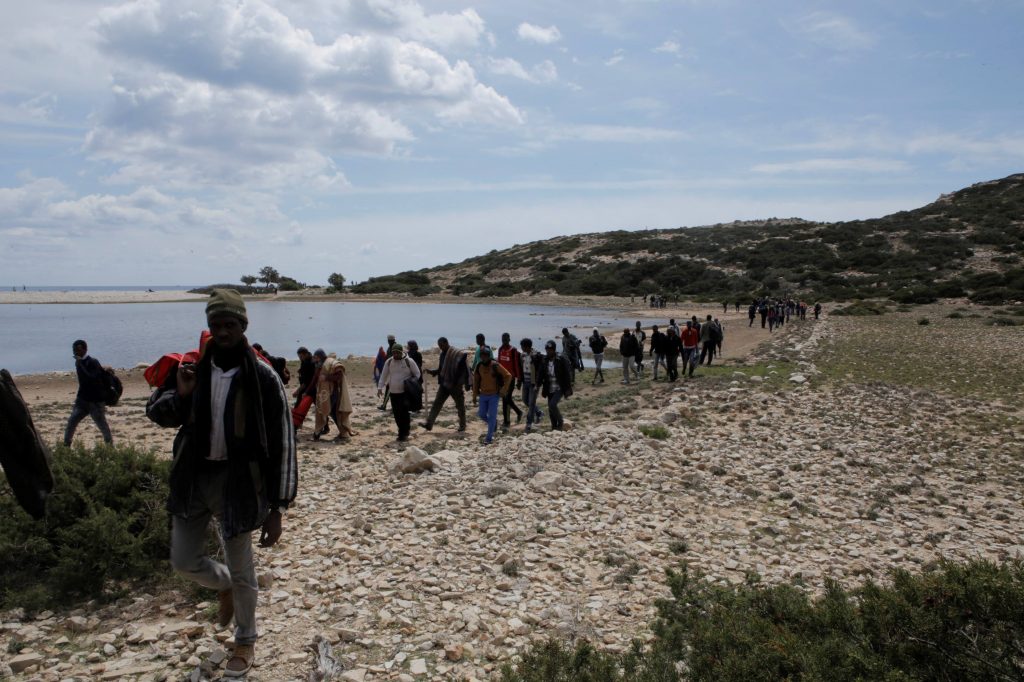Greece’s relevant migration and asylum minister on Tuesday emphasized that increased irregular migrant flows over the past two to three months are now aiming for Greek territory primarily from the “southern route”, i.e. Crete.
Minister Nikos Panagiotopoulos, a former defense minister, spoke on a morning current affairs program on Mega Channel.
He said the number of third country nationals attempting to illegally reach Greek territory in the region reaches 3,000 so far in 2024, compared to fewer such arrivals in 2023.
Panagiotopoulos said migrant boats depart from eastern Libya, with the subsequent modus operandi of trafficking being to either request assistance by nearby merchant vessels or the Greek coast guard upon nearing Crete, or, to clandestinely off-load third country nationals on the large island’s southern coast.

“Flows are increasing, primarily from the southeast Aegean, below (south) of the Dodecanese, from the Turkish shores and Africa. These people don’t stay too often in shelters in Greece because no one comes here to stay in Greece. All of them, or most of them want to move to northern Europe, and especially Germany,” he said.
According to the information related by Panagiotopoulos during the Mega Channel appearance, if an undocumented migrant reaches southern Crete, then the route foreseen is to travel to one of a handful of ports on the island’s northern side, take a ferry boat to the mainland in order to be recorded by authorities and to request asylum.
Panagiotopoulos said the people on such migrant boats over the recent period claim to be from war-plagued Syria, as well as Egypt and Pakistan.
Gavdos, Crete- Irregular Migrant ‘Corridor’
On the same day, Tuesday, another decrepit vessel loaded with 55 people was located south of the small isle of Gavdos – itself south of Crete in the Libyan Sea – with a Liberian-flagged freighter offering assistance and transporting the group to Crete.
According to local media reports, the irregular migrant flow are mostly comprised of men. The vessel, with little or no value, was confiscated by the coast guard.
Over the past three days, more than 300 individuals have been recorded as arriving on Crete and Gavdos via migrant boats.
In other statement, the relevant minister said 22,000 third country nationals who illegally entered the country are being hosted in temporary shelters around the country.

Asked about the recent decision by Germany to re-instate border controls on its frontier with other Schengen Pact member-states, at least for the coming months, in a bid to curb illegal migration to that country, Panagiotoupoulos ruled out the possibility of Athens accepting the return of asylum seekers and economic migrants that are in the central European country but first passed through Greece.
“No. We ruled this (prospect) out, and we even discussed it with the Germans. By the way, tomorrow I will be going to Luxembourg, where the first inter-ministerial meeting, at least in my term of office, of EU home Affairs and migration ministers will take place, where I think these issues will be at the center of the agenda … So, no, we will not see mass returns. We have discussed it; we have ruled it out and it’s also very difficult or impossible to do so … because such people are hard to track. Many people who have entered Germany, and it’s a big country, have family and friends; to be precise, they disappear. That is the word that is used, and they are very difficult to trace when the authority calls them to return them to the first host country, whether it is Greece or any country.”
Asked about the “delicate balance” that the Greek state is called upon to show in dealing with illegal migration, on the one hand, and fulfilling international obligation and humanitarian concerns, Panagiotopoulos said:
“Many say ‘what do you want them for?’, ‘why are you taking them?’, as if it’s up to us – people who come from the sea, persecuted, as refugees. Greece has its own history with refugees and immigrants, and I regret that so many people have forgotten this, they were our ancestors. We have to maintain a very delicate balance; a balance between humanitarianism, namely, not losing people, especially at sea, and rescuing them… On the other hand, there’s also the issue of border management, because border security enables the citizen to feel safe inside the country, so it is very important. The debate has been opened at European level, and I believe that this discussion will be extended to the guarding of borders, and I think that the political shift we are seeing in Europe will result in critical decisions, managing this problem in the strictest sense, with rules.”
Media reports: 17 European nations, including Greece, call for new laws to achieve ‘effective returns’ of irregular migrants
Panagiotopoulos’ comments on the same day as 17 countries within the Schengen Zone, including Greece, reportedly called for a revision of the legal framework to enable more effective returns of irregular migrants who do not have the right to remain in the Union.
Ahead of the EU Interior Ministers’ Council on Thursday in Luxembourg, which the Greek minister alluded to, and an upcoming EU summit next week, where the issue of returning illegal migrants will be high on the agenda, the 17 countries reportedly prepared and conveyed a “non-paper.”
According to media reports, the document, drafted by the Netherlands and Austria, is supported by France, Germany, Italy, Greece, Malta, the Czech Republic, Hungary, Denmark, Finland, Sweden, Croatia, and Lithuania, as well as non-EU members Switzerland, Norway and tiny Liechtenstein.
Specifically, the 17 call for a “new legal basis” that clearly defines the obligations and duties of third-country nationals subject to rulings ordering repatriation or deportation.
Reuters reported that the “17” signed an appeal calling on the EU executive to propose new rules making returns policies stricter. The letter to the Commission says migrants with no right to stay in the EU “must be held accountable,” according to the dispatch.
The development comes amid a political pivot to the right and far-right in several EU countries, fueled by sentiment against illegal immigration and mass entry of asylum seekers.


